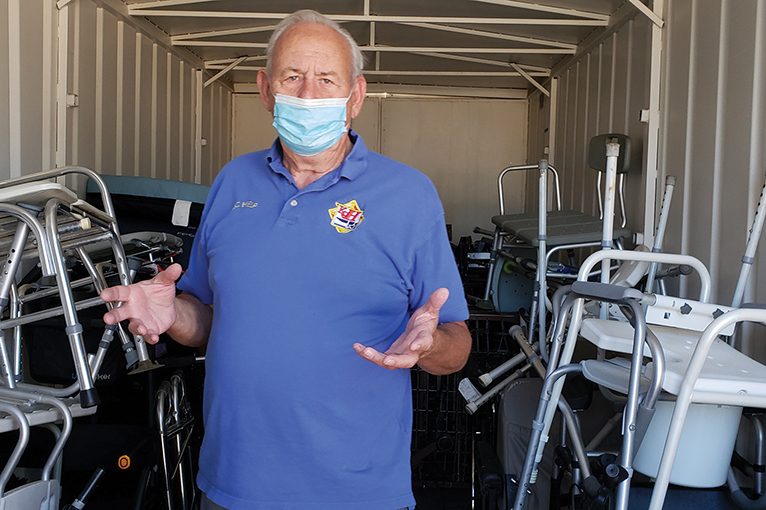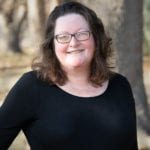
Home » Private donation boosts Pasco nonprofit to help region’s most vulnerable
Private donation boosts Pasco nonprofit to help region’s most vulnerable

August 14, 2020
A $40,000 private donation is helping a Pasco nonprofit and the people it serves stand a little taller.
An unidentified supporter contributed the money to the Knights Community Hospital Equipment Lend Program, better known as KC Help, through the Three Rivers Community Foundation.
The donation supports KC Help’s mission to help the most vulnerable Tri-Citians — people who need wheelchairs and other durable medical equipment that isn’t paid for by insurance or Medicare. It serves about 200 people each month and has exported its model across the Northwest and to Mexico.
KC Help spun out of the Tri-Cities Chaplaincy House in the mid-1990s after beginning as a group of volunteers who refitted homes to accommodate ill residents and their medical gear.
Jerry Rhoads, founder and chief executive officer, said it branched into durable medical equipment when it spied a gap — insurance and Medicare wouldn’t always pay for the equipment people needed. It tested the idea with a pilot in 1996.
“We were overwhelmed,” he recalled.
Rhoads, who spent his career as an electrical engineer in the Navy and then Energy Northwest, retired in 2001 to follow a calling to serve others. He leads a team of 40 volunteers who sanitize and repair thousands of donated wheelchairs, walkers, hospital beds, bathroom equipment and other in-home medical gear.
Their efforts have helped thousands of people live more mobile, comfortable lives. KC Help supplies wheelchairs — both motorized and non — crutches, hospital beds, bathroom assist, lifts, walkers and countless other items.
One patient still moves Rhoads to tears — a young girl with a blood disorder needed a wheelchair.
He recalls how the then 8-year-old smiled “ear to ear” when volunteers presented her with a bright yellow model. The child-sized chair was a tight fit but it’s what the organization had on hand. Rhoads told her to return soon and he would ensure she got a better fit.
The relationship continued for several years. The girl lost a leg and then her life a few years later when her illness progressed. Even now Rhoads is visibly moved by her memory. The girl’s beaming image is featured in the banner KC Help uses to highlight its work and honor her memory.
“There are 21,000 stories like that,” he said.
KC Help does not compete with for-profit companies that sell in-home medical supplies and it does not repair equipment it does not own. Rather it keeps its focus on serving people who need equipment who either have no insurance or whose providers won’t pay for it.
Wheelchairs are a classic example. A doctor might prescribe a motorized wheelchair for a patient with a deteriorating condition. But if the patient can walk with the aid of a walker — typically a metal frame that supplies stability and costs far less than a wheelchair — insurance and Medicare may refuse to cover it.
“The doctor can send a prescription to us and we can fill it,” he said.
It’s also rare for a patient to receive both a motorized wheelchair and a nonmotorized one, although there are many situations where the person using the chair might need to switch between the two, such as hilly locations. KC Help has hundreds of wheelchairs of both varieties at the ready, with more being donated all the time.
KC Help reaches clients through local health care organizations. Social workers regularly call on the nonprofit with lists of clients who need medical equipment.
KC Help first operated from a rented storage unit. But it needed room to clean, repair and store donated equipment and to meet with clients.
The storage unit didn’t get the job done. About five years ago, it bought a small commercial building just north of Pasco City Hall.
The state Knights of Columbus chapter supplied $70,000 to help retrofit the building in support of the local chapters that birthed the nonprofit. KC Help took out a $160,000 mortgage, which has a current balance of about $50,000.
Rhoads said the $40,000 gift will help reduce debt and support efforts while financial donations are dimmed by the Covid-19 pandemic. He would like to dedicate some to creating an endowment fund to give KC Help a continuing source of revenue.
Its annual budget of $83,000 covers both the Pasco operation and a separate one in Wenatchee.
The Pasco building was a disjointed structure with multiple additions and a leaking roof. Volunteers cleaned it up and renovated it with a donation station, room to welcome clients, cleaning and maintenance stations and lots of storage.
Local contractors stepped in too. Don Pratt, the late homebuilder and Tri-Citian of the Year, teamed with the Tri-City Home Builders Association to replace with leaky roof with a 50-year model that will serve it for decades. That’s one of countless examples of builders who stepped up to help, he said.
KC Help briefly shut its Pasco center when the Covid-19 pandemic forced it to rethink how it processes donations and meets with the public. Today, donated equipment is placed in an external container equipped with a commercial grade disinfection system. From there, donations are brought inside for scrubbing and repairs.
Masked volunteers greet visitors under a tent in front of the building.
While KC Help is a passion project for Rhoads and a core group of volunteers, its leader said the community is responsible for its success.
KC Help began as a pilot in 1996 and applied for 501(c)(3) status in 1997. Rhoads organized the nonprofit as a thesis project for his master’s in engineering management at Washington State University Tri-Cities.
He helped it become a true nonprofit — relying on donations of equipment and cash. He deliberately avoided charging fees, though beneficiaries are welcome to make donations and it does ask clients to pay for consumable equipment such as wheelchair batteries.
Professors challenged the donation model when he presented his theses, saying KC Help had too little income to work.
Rhoads had an answer ready: If the community wants this, it will support it.
Community support has been fierce and continuous. Donated equipment arrives like clockwork during its Tuesday and Thursday hours. During a tour, owners of a private care home brought in equipment they no longer needed because the user had died. Volunteers greeted the regular visitors by name.
“There’s really nothing we can’t do if we come together as a community,” he said.
KC Help is preparing to expand its Pasco center. Rhoads wants to make the changes forced by Covid-19 permanent. That means adding more space to welcome clients and to sanitize and store donated equipment.
The concept is preliminary. But Rhoads is optimistic.
“This community created this,” he said.
Local News Charitable Giving & Nonprofits Nonprofits
KEYWORDS august 2020





